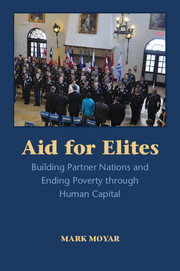Book contents
- Frontmatter
- Contents
- Preface
- Acknowledgments
- 1 Pathways to Development
- 2 How Governments Work
- 3 Civilization
- 4 Human Capital Development
- 5 Human Capital and National Security
- 6 Training
- 7 Militarization
- 8 Education in the Third World
- 9 Education in the United States
- 10 Support
- 11 Measurement
- 12 Conclusion: A New Foreign Assistance Strategy
- Notes
- Index
12 - Conclusion: A New Foreign Assistance Strategy
Published online by Cambridge University Press: 05 December 2015
- Frontmatter
- Contents
- Preface
- Acknowledgments
- 1 Pathways to Development
- 2 How Governments Work
- 3 Civilization
- 4 Human Capital Development
- 5 Human Capital and National Security
- 6 Training
- 7 Militarization
- 8 Education in the Third World
- 9 Education in the United States
- 10 Support
- 11 Measurement
- 12 Conclusion: A New Foreign Assistance Strategy
- Notes
- Index
Summary
After 9/11, the United States did not need long to adopt a grand strategy better suited to impeding international terrorism, in which the bolstering of third world governments occupied a central role. Ever since, the obvious importance building of partner-nation capacity has ensured that Americans of all political persuasions support a certain amount of assistance to third world partners. But building partner-nation capacity has been much easier said than done, and realization of that truth is eroding the will of the United States to fund it. Today, the United States still lacks a foreign assistance strategy that can produce the desired improvements to the capabilities of third world nations. This chapter outlines a strategy that can achieve the optimal improvements, drawing together the findings of the preceding chapters.
Much of the blame for the ineffectiveness of America's foreign assistance can be traced to misapprehension of the dynamics of human societies. Convinced that the economic and social development of poor nations should be promoted first and foremost, American development thinkers have given too little attention to governance and security, the essential prerequisites for development. Investing in development in the absence of good governance and security is counterproductive, for officials focus on siphoning off aid instead of governing, and enemies of the state steal or destroy the seeds and fruits of development work. But achieving good governance and security requires resources, which are difficult for economically underdeveloped nations to accumulate, so foreign aid can make a real difference when reoriented toward good governance and security.
Recent theorizing on nation building has focused on impersonal institutions and policies as the main drivers of good governance. Just as inordinate preoccupation with sins may divert attention from the people who commit those sins, so has the single-minded concern with institutions and policies obscured the government leaders who guide those institutions and policies. Consequently, foreign assistance programs have often sought to achieve results by other, less productive routes than human capital development.
Multiculturalism has hidden the truth that civilization and its main components, culture and religion, exert enormous influence over the quality of human capital, especially in terms of human motivation. The United States can readily contribute to foreign human capital development by providing skills and experience, but achieving transformational change requires the changing of motives, which is much more difficult because it requires alteration of culture or religion.
- Type
- Chapter
- Information
- Aid for ElitesBuilding Partner Nations and Ending Poverty through Human Capital, pp. 195 - 202Publisher: Cambridge University PressPrint publication year: 2016

